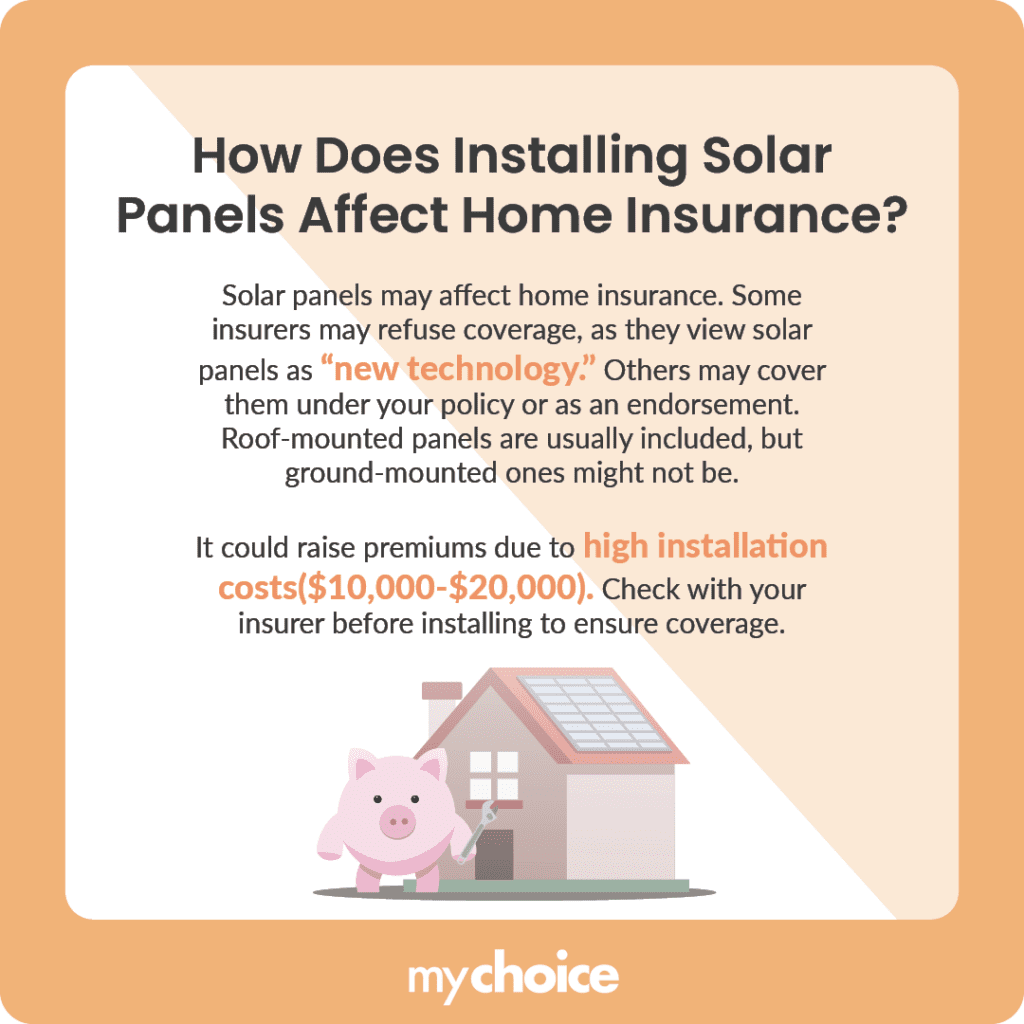The push for renewable energy sources has led many Canadians to consider solar panel installations as a way to reduce their carbon footprint and lower energy costs. However, the transition to solar energy can come with unexpected complications, particularly regarding home insurance.
How many Canadian households have solar energy installed? Does your home insurance policy cover solar panels? Read on to learn about solar energy in Canada.
How Does Installing a Solar Panel Impact My Home Insurance?
While solar energy can be amazing for your carbon footprint and property value, solar panels and home insurance might not be the most compatible. Some homeowners have experienced their coverage being pulled after installing solar panels.
Unfortunately for homeowners interested in solar energy, many insurance companies consider solar panels “new technology”, and hesitate to provide coverage due to lack of experience. However, some insurance companies can offer coverage for solar panels either as part of the base home insurance policy or as a separate endorsement.
Before you consider installing solar panels, be sure to check with your insurance company to make certain that you’ll remain covered under your home insurance policy. Take note that roof-mounted solar panels will be counted as part of your house, while ground-mounted solar panels may not be considered as such.
If your insurance company does provide coverage for your solar panels, then you should be prepared to see an increase in your home insurance premiums. Solar panels can cost between $10,000 and $20,000 to install and can add a significant amount to your insurance rates. Check with your insurance company to determine how much solar panels can add to your yearly premiums.

State of Solar Panel Installation in Households Across Canada
Canada’s solar energy market has experienced significant growth in recent years. As of 2023, Canada boasts an installed solar capacity of over 5.8 gigawatts (GW), marking a significant increase from previous years. This growth is attributed to a combination of technological advancements, decreasing costs, and supportive government policies aimed at promoting renewable energy sources.
The residential solar market has become a key driver of this growth. By 2023, residential solar photovoltaic (PV) systems accounted for about one-third of the total installed capacity in Canada, with significant contributions from provinces like Ontario, Alberta, and Quebec.
Alberta has emerged as a leader in solar installations, with cumulative capacity reaching approximately 1.7 GW by 2023. Other provinces such as Saskatchewan and Ontario are also making strides, although Ontario’s growth has slowed due to regulatory pauses on new developments.
What Are the Benefits of Installing Solar Panels in My Home?
Installing solar panels in your home offers numerous benefits that extend beyond mere energy savings. One of the most compelling reasons to install solar panels is the potential for significant cost savings on electricity bills. By generating your own electricity, you reduce your reliance on the grid, which can lead to lower monthly utility expenses.
Solar panels are often viewed as valuable upgrades to a property, similar to a renovated kitchen or bathroom. As more homebuyers prioritize sustainability, properties with solar systems become increasingly attractive in the real estate market. Studies have shown that homes equipped with solar energy systems tend to sell for more than those without.
Switching to solar energy can also significantly reduce your carbon footprint and contribute to a healthier environment. Each kilowatt-hour (kWh) of solar-generated electricity can substantially lower greenhouse gas emissions since solar power harnesses the sun’s energy without depleting natural resources.
Solar panels also require minimal maintenance once installed, making them a hassle-free option for homeowners. With no moving components, solar systems experience little wear and tear, resulting in lower upkeep costs compared to other energy solutions. Most solar panels have warranties lasting 25 years or more, and they typically require only occasional cleaning to remove dirt and debris.
Solar Energy Rebates
As the demand for solar energy increases across Canada, various rebate programs have emerged to incentivize homeowners to install solar panels. These rebates can significantly reduce the initial investment required for solar systems, making renewable energy more accessible. Here is an overview of the key solar energy rebate programs available in different provinces and territories:
| Province/Territory | Incentive Program | Incentive Amount ($/KW) |
|---|---|---|
| Alberta | Solar Rebate Program | Up to $0.75/KW |
| British Columbia | SolarBC Incentive | $0.60/KW |
| Manitoba | Solar Energy Program | $0.50/KW |
| New Brunswick | Solar Energy Rebates | $0.65/KW |
| Nova Scotia | SolarHomes Program | $1.00/KW |
| Ontario | Net Metering Rebate | $0.85/KW |
| Prince Edward Island | Solar Electric Rebate | $1.20/KW |
| Quebec | Energy Transition Quebec | $0.75/KW |
| Saskatchewan | Net Metering Rebate | $0.55/KW |
In addition to provincial programs, the federal government offers incentives that can further support homeowners looking to install solar panels:
- Canada Greener Homes Grant: Homeowners can receive up to $5,000 for making energy-efficient retrofits, including installing solar panels.
- Clean Energy Investment Tax Credit: A refundable tax credit of 30% on capital costs associated with investments in clean energy, including solar systems.
These incentives aim to alleviate some financial burdens associated with transitioning to renewable energy sources. While the initial investment may be significant, these incentives help offset costs, leading to long-term savings on electricity bills and increased property value.
Key Advice from MyChoice
- Some insurance companies may pull coverage if you install solar panels. Be sure to ask your insurer whether they provide coverage for solar panels before committing to an installation.
- You can use a home insurance calculator to determine how much installing solar panels in your home would increase your home insurance rates.
- You can take advantage of federal and provincial incentives to make installing solar panels cheaper.








